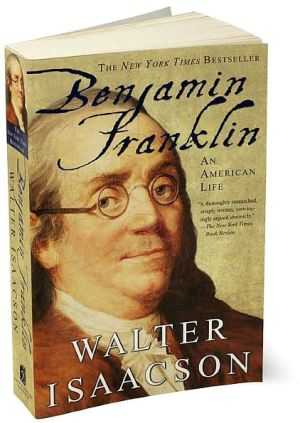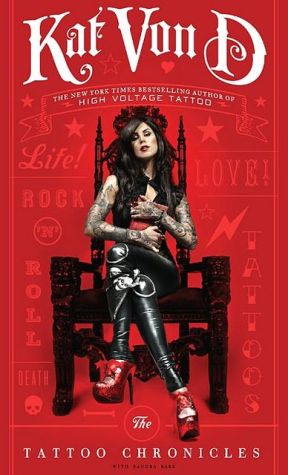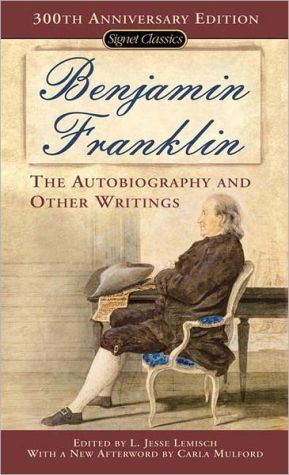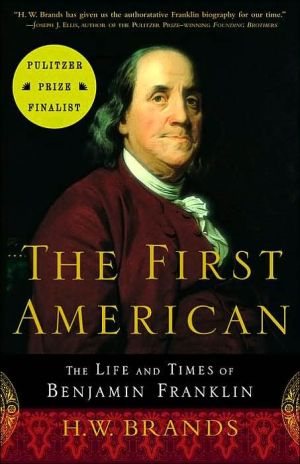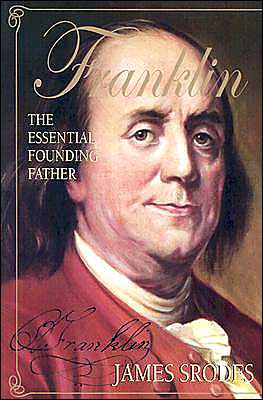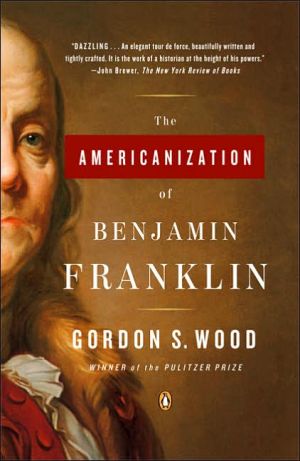Benjamin Franklin: An American Life
Benjamin Franklin is the founding father who winks at us, the one who seems made of flesh rather than marble. In this authoritative and engrossing full-scale biography, Walter Isaacson shows how the most fascinating of America's founders helped define our national character.\ In a sweeping narrative that follows Franklin's life from Boston to Philadelphia to London and Paris and back, Isaacson chronicles the adventures of the spunky runaway apprentice who became, during his 84-year life,...
Search in google:
Benjamin Franklin is the founding father who winks at us, the one who seems made of flesh rather than marble. In this authoritative and engrossing full-scale biography, Walter Isaacson shows how the most fascinating of America's founders helped define our national character. In a sweeping narrative that follows Franklin's life from Boston to Philadelphia to London and Paris and back, Isaacson chronicles the adventures of the spunky runaway apprentice who became, during his 84-year life, America's best writer, inventor, media baron, scientist, diplomat, and business strategist, as well as one of its most practical and ingenious political leaders. He explores the wit behind Poor Richard's Almanac and the wisdom behind the Declaration of Independence, the new nation's alliance with France, the treaty that ended the Revolution, and the compromises that created a near-perfect Constitution. Above all, Isaacson shows how Franklin's unwavering faith in the wisdom of the common citizen and his instinctive appreciation for the possibilities of democracy helped to forge an American national identity based on the virtues and values of its middle class.The New York TimesIt is a thoroughly researched, crisply written, convincingly argued chronicle that is also studded with little nuggets of fresh information... Instead of Franklin's Boswell, Isaacson comes across as his Edward R. Murrow, diligently and often deftly interrogating the man while sifting through the veritable mountain of scholarship that has accumulated around him over the past two centuries. --Joseph J. Ellis
Chapter One: Benjamin Franklin and the Invention of America\ His arrival in Philadelphia is one of the most famous scenes in autobiographical literature: the bedraggled 17-year-old runaway, cheeky yet with a pretense of humility, straggling off the boat and buying three puffy rolls as he wanders up Market Street. But wait a minute. There's something more. Peel back a layer and we can see him as a 65-year-old wry observer, sitting in an English country house, writing this scene, pretending it's part of a letter to his son, an illegitimate son who has become a royal governor with aristocratic pretensions and needs to be reminded of his humble roots.\ A careful look at the manuscript peels back yet another layer. Inserted into the sentence about his pilgrim's progress up Market Street is a phrase, written in the margin, in which he notes that he passed by the house of his future wife, Deborah Read, and that "she, standing at the door, saw me and thought I made, as I certainly did, a most awkward ridiculous appearance." So here we have, in a brief paragraph, the multilayered character known so fondly to his author as Benjamin Franklin: as a young man, then seen through the eyes of his older self, and then through the memories later recounted by his wife. It's all topped off with the old man's deft little affirmation — "as I certainly did" — in which his self-deprecation barely cloaks the pride he felt regarding his remarkable rise in the world.\ Benjamin Franklin is the founding father who winks at us. George Washington's colleagues found it hard to imagine touching the austere general on the shoulder, and we would find it even more so today. Jefferson and Adams are just as intimidating. But Ben Franklin, that ambitious urban entrepreneur, seems made of flesh rather than of marble, addressable by nickname, and he turns to us from history's stage with eyes that twinkle from behind those newfangled spectacles. He speaks to us, through his letters and hoaxes and autobiography, not with orotund rhetoric but with a chattiness and clever irony that is very contemporary, sometimes unnervingly so. We see his reflection in our own time.\ He was, during his eighty-four-year-long life, America's best scientist, inventor, diplomat, writer, and business strategist, and he was also one of its most practical, though not most profound, political thinkers. He proved by flying a kite that lightning was electricity, and he invented a rod to tame it. He devised bifocal glasses and clean-burning stoves, charts of the Gulf Stream and theories about the contagious nature of the common cold. He launched various civic improvement schemes, such as a lending library, college, volunteer fire corps, insurance association, and matching grant fund-raiser. He helped invent America's unique style of homespun humor and philosophical pragmatism. In foreign policy, he created an approach that wove together idealism with balance-of-power realism. And in politics, he proposed seminal plans for uniting the colonies and creating a federal model for a national government.\ But the most interesting thing that Franklin invented, and continually reinvented, was himself. America's first great publicist, he was, in his life and in his writings, consciously trying to create a new American archetype. In the process, he carefully crafted his own persona, portrayed it in public, and polished it for posterity.\ Partly, it was a matter of image. As a young printer in Philadelphia, he carted rolls of paper through the streets to give the appearance of being industrious. As an old diplomat in France, he wore a fur cap to portray the role of backwoods sage. In between, he created an image for himself as a simple yet striving tradesman, assiduously honing the virtues — diligence, frugality, honesty — of a good shopkeeper and beneficent member of his community.\ But the image he created was rooted in reality. Born and bred a member of the leather-aproned class, Franklin was, at least for most of his life, more comfortable with artisans and thinkers than with the established elite, and he was allergic to the pomp and perks of a hereditary aristocracy. Throughout his life he would refer to himself as\ "B. Franklin, printer."\ From these attitudes sprang what may be Franklin's most important vision: an American national identity based on the virtues and values of its middle class. Instinctively more comfortable with democracy than were some of his fellow founders, and devoid of the snobbery that later critics would feel toward his own shopkeeping values, he had faith in the wisdom of the common man and felt that a new nation would draw its strength from what he called "the middling people." Through his self-improvement tips for cultivating personal virtues and his civic-improvement schemes for furthering the common good, he helped to create, and to celebrate, a new ruling class of ordinary citizens.\ The complex interplay among various facets of Franklin's character — his ingenuity and unreflective wisdom, his Protestant ethic divorced from dogma, the principles he held firm and those he was willing to compromise — means that each new look at him reflects and refracts the nation's changing values. He has been vilified in romantic periods and lionized in entrepreneurial ones. Each era appraises him anew, and in doing so reveals some assessments of itself.\ Franklin has a particular resonance in twenty-first-century America. A successful publisher and consummate networker with an inventive curiosity, he would have felt right at home in the information revolution, and his unabashed striving to be part of an upwardly mobile meritocracy made him, in social critic David Brooks's phrase, "our founding Yuppie." We can easily imagine having a beer with him after work, showing him how to use the latest digital device, sharing the business plan for a new venture, and discussing the most recent political scandals or policy ideas. He would laugh at the latest joke about a priest and a rabbi, or about a farmer's daughter. We would admire both his earnestness and his self-aware irony. And we would relate to the way he tried to balance, sometimes uneasily, the pursuit of reputation, wealth, earthly virtues, and spiritual values.\ Some who see the reflection of Franklin in the world today fret about a shallowness of soul and a spiritual complacency that seem to permeate a culture of materialism. They say that he teaches us how to live a practical and pecuniary life, but not an exalted existence. Others see the same reflection and admire the basic middle-class values and democratic sentiments that now seem under assault from elitists, radicals, reactionaries, and other bashers of the bourgeoisie. They regard Franklin as an exemplar of the personal character and civic virtue that are too often missing in modern America.\ Much of the admiration is warranted, and so too are some of the qualms. But the lessons from Franklin's life are more complex than those usually drawn by either his fans or his foes. Both sides too often confuse him with the striving pilgrim he portrayed in his autobiography. They mistake his genial moral maxims for the fundamental faiths that motivated his actions.\ His morality was built on a sincere belief in leading a virtuous life, serving the country he loved, and hoping to achieve salvation through good works. That led him to make the link between private virtue and civic virtue, and to suspect, based on the meager evidence he could muster about God's will, that these earthly virtues were linked to heavenly ones as well. As he put it in the motto for the library he founded, "To pour forth benefits for the common good is divine." In comparison to contemporaries such as Jonathan Edwards, who believed that men were sinners in the hands of an angry God and that salvation could come through grace alone, this outlook might seem somewhat complacent. In some ways it was, but it was also genuine.\ Whatever view one takes, it is useful to engage anew with Franklin, for in doing so we are grappling with a fundamental issue: How does one live a life that is useful, virtuous, worthy, moral, and spiritually meaningful? For that matter, which of these attributes is most important? These are questions just as vital for a self-satisfied age as they were for a revolutionary one.\ Copyright © 2003 by Walter Isaacson
Ch. 1Benjamin Franklin and the Invention of America1Ch. 2Pilgrim's Progress: Boston, 1706-17235Ch. 3Journeyman: Philadelphia and London, 1723-172636Ch. 4Printer: Philadelphia, 1726-173252Ch. 5Public Citizen: Philadelphia, 1731-1748102Ch. 6Scientist and Inventor: Philadelphia, 1744-1751129Ch. 7Politician: Philadelphia, 1749-1756146Ch. 8Troubled Waters: London, 1757-1762175Ch. 9Home Leave: Philadelphia, 1763-1764206Ch. 10Agent Provocateur: London, 1765-1770219Ch. 11Rebel: London, 1771-1775252Ch. 12Independence: Philadelphia, 1775-1776290Ch. 13Courtier: Paris, 1776-1778325Ch. 14Bon Vivant: Paris, 1778-1785350Ch. 15Peacemaker: Paris, 1778-1785382Ch. 16Sage: Philadelphia, 1785-1790436Ch. 17Epilogue471Ch. 18Conclusions476Cast of Characters495Chronology503Currency Conversions507Acknowledgments509Sources and Abbreviations513Notes519Index567
\ From Barnes & NobleThe Barnes & Noble Review\ In this engaging biography, journalist Walter Isaacson captures the gregarious essence of Benjamin Franklin, the Founding Father who has earned a special place in the pantheon of American patriots by dint of sheer approachability. \ Brilliant but not intellectual, principled but not priggish, Franklin was an original thinker whose genius lay less in profound thoughts than in practical ideas and homely wisdom. As he rose in station from impoverished young printer's apprentice to venerable statesman and man of means, he hobnobbed with aristocrats, royals, and some of the greatest thinkers of the Enlightenment; but he never lost touch with the common man whose standard he carried proudly throughout his long, eventful life.\ Franklin's glittering accomplishments -- the famous experiments and inventions, the stirring articles and treatises, and the shrewd diplomatic coups -- were fueled by pragmatism, entrepreneurial energy, and self-promotion, all solid middle-class values. Isaacson shows us how the enterprising young tradesman exaggerated (particularly in his writings) bourgeois virtues like industriousness, frugality, and honesty to create a new American archetype -- the self-made man -- and how this persona, which was both a reflection and a caricature of Franklin's natural self, worked both for and against him in his personal relationships.\ What emerges from this lively study is the fascinating portrait of a flawed and complicated man: a canny charmer, a brilliant inventor, a gifted diplomat, and a public-spirited citizen, but most of all a passionate populist with an unwavering faith in the wisdom of his fellow citizens, whose vision of America shaped his own age and continues to influence our own. Anne Markowski\ \ \ \ \ \ The Washington PostIsaacson has crafted a wonderfully written biography, and his treatment of Franklin's youth and rise to prominence is insightful and imaginative. It sparkles as well in chronicling some areas of Franklin's life following his retirement, especially the evolution of his views on religion and slavery, and his troubled and insensitive relationships with members of his family. Indeed, readers likely will be thankful not to have been Franklin's warm friend (he broke off most such relationships), his competitor (he steamrolled most rivals) or a member of his family (he treated many with shabby indifference, if not cruelty). — John Ferling\ \ \ The New York TimesIt is a thoroughly researched, crisply written, convincingly argued chronicle that is also studded with little nuggets of fresh information... Instead of Franklin's Boswell, Isaacson comes across as his Edward R. Murrow, diligently and often deftly interrogating the man while sifting through the veritable mountain of scholarship that has accumulated around him over the past two centuries. --Joseph J. Ellis\ \ \ \ \ The New York Review of Books...Isaacson treats Franklin almost as if he were one of our contemporaries, an interesting American of great talent and sensible values whom we ough to get to know. \ ....During the past few years we have had several Franklin biographies, of which Walter Isaacson's is the most recent and the finest. — Gordon S. Wood\ \ \ \ \ ForbesIf Ben Franklin were alive today, would he be enamored of flashy tech stocks? No, he'd have been attracted to value.\ Frugality, humility, generosity. Benjamin Franklin was an extraordinary soul who was the paragon of these character traits. In reading Walter Isaacson's new biography, Benjamin Franklin: An American Life (Simon & Schuster), I was struck by how this portrait of a man born in 1706 epitomizes the most basic tenets of successful investing today. The qualities of great companies often mirror the same qualities of great individuals like Franklin.\ A man with diverse interests, numerous careers and a litany of titles--statesman, writer, inventor, scientist, poli-tician, musician, diplomat--Franklin was a true Renaissance man. Despite impressive credentials, he was so proud of his modest first job that he always introduced himself as "Benjamin Franklin, printer." Fond of pitching ideas under a pseu-donym, Franklin was always careful to credit his accomplishments to others, overlooking his ego in the name of team-work.\ Although the complex and vibrant U.S. industrial economy arrived years after his death, Franklin's sense of business conduct underpins our modern system today. He knew that the pursuit of profit should not slight ethics. A capitalist system permeated by liars and cheats will fail. Isaacson writes of how Franklin believed "spiritual salvation and secular success need not be at odds, that industriousness is next to godliness."\ This is the man who also said: "A penny saved is a penny earned." If the frugal Franklin were alive today, he would be a value investor. And I'll wager that old Ben would like these excellent companies, which are repositories of what hestood for.\ Bob Evans Farms (31) is a veritable slice of Americana in your frying pan. Founded in 1953, Bob Evans has heeded Franklin's maxim: Make haste slowly. With revenue growth at a steady 4% five-year average, the company sells sausage and other food products to retail grocery chains and also operates 537 family-style restaurants. Although many of us are familiar with the company's catchy jingle, "down on the farm," Wall Street has been down on something else--the stock's valuation. Consistent and predictable not only with its classic menu but also with earnings, Bob Evans is the polar opposite of flashy and trendy.\ At the tech bubble's high point in March 2000, Bob Evans hit a five-year low of $12. Confident in the com-pany's long-term prospects, though, management took this opportunity to eat its own cooking, so to speak, buying back stock at a discount and continuing to do so regularly. Since then the company has repurchased 15% of its shares out-standing. Now it sells for 15 times trailing and 14 times forward 12-month earnings and at an 11% discount to my $35 estimation of intrinsic worth.\ The civic-minded Franklin knew how to foster communities, the bedrock of a nation. He bolstered Philadel-phia, where he spent most of his adult life, by creating a lending library, a volunteer fire department and a college. The same goes for Rouse Co. (45), which is helping rebuild America from the ground up. In the 1960s the company in-vented a modern planned community, Columbia, Md., an esthetically and environmentally friendly place that caters to a diverse population. More recently it purchased fast-growing Summerlin, Nev. With such projects as Baltimore's Har-borplace, Boston's Faneuil Hall and New York's South Street Seaport, Rouse has revitalized urban centers.\ A real estate investment trust that mainly specializes in upscale shopping centers, Rouse operates 150 proper-ties, including retail, research and development, office and industrial space in 22 states. For the past decade Rouse has executed a disciplined plan to upgrade the quality of its malls, continually acquiring and building prime retail centers as it relentlessly prunes the weaker ones from the portfolio. Despite this company's proven record, its stock is undervalued. Shares sell for 11 times trailing and forward funds from operations (roughly, net income plus depreciation) and at a 4% discount to their intrinsic worth, which I estimate at $47.\ Franklin also published a newspaper and venerated the role of a free press in a democratic society. A key piece of this tradition today is cost-conscious Tribune Co. (49). With 13 dailies, including the Chicago Tribune and the Los Angeles Times, the company is one of the nation's top newspaper publishers, as well as a broadcaster and Web site op-erator (50 of them). The stock sells for 24 times trailing earnings--in line with the industry average--and 20 times for-ward, and at a 33% discount to its $73 intrinsic worth.\ Franklin wrote that "industry and frugality," two virtues that are too little seen these days, were "the means of procuring wealth." These three stocks exemplify these virtues.\ John W. Rogers Jr. is chairman and chief executive officer of Chicago-based Ariel Capital Management, Inc., the adviser to the Ariel Mutual Funds. Visit his home page at www.forbes.com/rogers.\ —John W. Rogers Jr.\ \ \ \ \ \ Publishers WeeklyMost people's mental image of Ben Franklin is that of an aged man with wire-rim glasses and a comb-over, flying a kite in a thunder storm, or of the spirited face that stares back from a one-hundred-dollar bill. Isaacson's (Kissinger) biography does much to remind us of Franklin's amazing depth and breadth. At once a scientist, craftsman, writer, publisher, comic, sage, ladies' man, statesman, diplomat and inventor, Franklin not only wore many hats, but in many cases, did not have an equal. The most intriguing thing he invented, and continued to reinvent, according to Isaacson, was himself. Three-time Tony winner Gaines has an obvious interest and affinity for the material. His delivery of Isaacson's factual yet fascinating biography is informative and friendly with an instructional yet casual tone, like that of a gregarious narrator of an educational film. All things considered, Gaines is a good match for the material. He has the authority to deliver historical facts and the enthusiasm to keep listeners interested. Simultaneous release with the Simon & Schuster hardcover (Forecasts, May 12). (July) Copyright 2003 Reed Business Information.\ \ \ \ \ Foreign AffairsBenjamin Franklin was the most genial and engaging of the founders, and Isaacson has produced a biography to match. Franklin's life is a well-ploughed topic, but by concentrating on his relationships with family and friends, Isaacson sheds new light on America's first true world citizen. Not all of this light is flattering. Franklin was a cold and even brutal father; he missed the weddings of both his daughter and his son and was absent at the death of his wife. He seems to have valued sociability above intimacy; the qualities that made him so amiable to the world at large made him less than reliable in family relations. On the other hand, his genuine and generally chaste (Isaacson stoutly maintains) friendships with bright young women were marked by real interest in their opinions and respect for their intellectual qualities. Isaacson handles the twists and turns of Franklin's political views with sensitivity and understanding and makes an eloquent case for considering Franklin a major figure in the history of science. His discussion of Franklin's early prose works is charming and direct, as is his evident respect for historians such as Edmund Morgan and Bernard Bailyn whose earlier works on Franklin have set the bar for new biographies very high.\ \ \ \ \ Library JournalA former Time magazine managing editor and former CNN chair/CEO, now serving as Aspen Institute president, Isaacson (Kissinger: A Biography) here presents what he calls "a chronological narrative biography" of Benjamin Franklin. The result is an admirable work that takes its place among recently acclaimed biographies by H.W. Brands and Edmund Morgan as one with special appeal to a general audience. Isaacson considers the social activist and historical actor, focusing on Franklin as "a civic-minded man" who expressed the virtues and values of a rising middle class, America's new ruling class of ordinary citizens. He also highlights Franklin's personal relations with numerous individuals-including his common-law wife, Deborah Read-his famous moments and achievements, e.g., the kite-flying electricity experiment, and his evolving social thought on a range of issues, including slavery. Isaacson serves the needs of nonspecialists with three helpful sections: a "Chronology" of Franklin's life, a "Cast of Characters" of the most important men and women Franklin knew, and "Currency Conversions." A fine addition to the Franklin literature, this book is recommended mainly for public libraries.-Charles L. Lumpkins, Pennsylvania State Univ., State College Copyright 2003 Reed Business Information.\ \ \ \ \ Kirkus ReviewsNicely done life of "the most accomplished American of his age." Benjamin Franklin may have been among the leading revolutionary firebrands of his time, but, suggests Aspen Institute president Isaacson (Kissinger, 1992), he wouldn’t be at all out of place in an office park or perhaps Rotary Club meeting today. That doesn’t mean to say that Franklin was a proto-Republican, but instead a practical-minded businessman who found much virtue in striking compromises, building consensus, and networking—and who pinched pennies with the best of them, adopting vegetarianism only so that the money saved on meat could go into his savings and studies. Yet, all that said, Isaacson reminds us that Franklin essentially retired, wealthy and content, in his early 40s and devoted the rest of his days to doing acts of public good, pressing the cause of meritocracy in the service of "social mobility rather than an established elite" and furthering the cause of American independence at considerable risk to his property and person. Isaacson charts the trajectory of Franklin’s political thought on all kinds of matters; he notes, for instance, that although Franklin enthusiastically accepted advertisements for slave sales in the newspapers he published and owned "one or two household slaves off and on for much of his life," he came to see the incompatibility of such commerce with the revolutionary ideals he espoused and ended his days as a committed abolitionist. Similarly, as the very exemplar of a self-made man, Franklin gave much thought to the inequalities wrought by inherited fortune, arguing "that the accumulation of excess wealth and the idle indulgence in frivolous luxuries should not be sociallysanctioned." Alas, Franklin’s arguments did not carry the day in most particulars, but he remains an ideal American type—and one well served by this sympathetic and admiring study. A little less sophisticated than H.W. Brands’s The First American, but a solid contribution to Frankliniana all the same. Agent: Amanda Urban/ICM\ \
